The global glow-boosting phytoplankton market is projected to grow from USD 1,152.9 million in 2025 to approximately USD 3,948.4 million by 2035, recording an absolute increase of USD 2,801.02 million over the forecast period. This translates into a total growth of 243.2%, with the market forecast to expand at a compound annual growth rate (CAGR) of 13.1% between 2025 and 2035. The overall market size is expected to grow by nearly 3.4X during the same period, supported by the rising adoption of marine biotechnology in skincare formulation and increasing demand for sustainable beauty solutions.
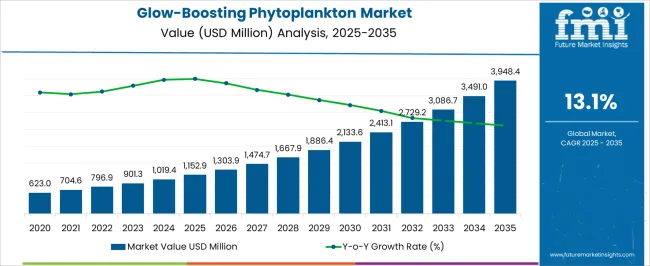
Between 2025 and 2030, the market is projected to expand from USD 1,152.9 million to USD 2,134.6 million, resulting in a value increase of USD 983.22 million, which represents 35.1% of the total forecast growth for the decade. This phase of growth will be shaped by rising penetration of marine biotechnology in beauty and skincare, increasing consumer demand for sustainable and natural solutions, and growing awareness about the benefits of phytoplankton-derived active ingredients. Manufacturers are expanding their marine cultivation capabilities to address the growing complexity of sustainable ingredient requirements.
From 2030 to 2035, the market is forecast to grow from USD 2,134.6 million to USD 3,952.4 million, adding another USD 1,817.8 million, which constitutes 64.9% of the overall ten-year expansion. This period is expected to be characterized by advancement of marine biotechnology cultivation methods, integration of sustainable production technologies, and development of sophisticated extraction platforms across different application channels. The growing adoption of vegan and clean-label formulations will drive demand for more advanced phytoplankton-derived active ingredients.
Between 2020 and 2025, the Glow-Boosting Phytoplankton market experienced rapid expansion, driven by technological breakthroughs in marine biotechnology and increasing consumer awareness of sustainable beauty ingredients. The market developed as consumers became increasingly conscious of environmental impact and beauty brands recognized the potential of phytoplankton-derived actives to differentiate their offerings and enhance product efficacy.
| Metric | Value |
|---|---|
| Estimated Size (2025E) | USD 1,152.9 million |
| Projected Value (2035F) | USD 3,948.4 million |
| CAGR (2025 to 2035) | 13.1% |
Market expansion is being supported by the rapid advancement of marine biotechnology and increasing consumer demand for sustainable skincare solutions that address skin radiance concerns through natural, eco-friendly ingredients. Modern consumers seek products that are specifically formulated with renewable marine resources, moving away from synthetic alternatives toward scientifically-backed, sustainable formulations that deliver measurable glow-enhancing results.
The growing sophistication of marine cultivation technologies, including controlled bioreactor systems, sustainable harvesting methods, and advanced extraction processes, is enabling more efficient production and driving demand for phytoplankton-powered beauty platforms. Beauty brands are increasingly investing in marine biotechnology capabilities to offer differentiated products that can provide superior radiance benefits while maintaining environmental sustainability credentials.
The market is segmented by source, function, product type, channel, and claim. By source, the market is divided into marine phytoplankton, microalgae extracts, cyanobacteria-based, and engineered phytoplankton actives. Based on function, the market is categorized into glow & radiance enhancement, brightening, hydration, and anti-aging. In terms of product type, the market is segmented into serums, creams/lotions, masks, and supplements/nutricosmetics.
By channel, the market is classified into e-commerce, natural/organic beauty stores, pharmacies, and specialty beauty retail. Based on claim, the market includes vegan, clean-label, COSMOS-certified, and blue-biotech. Regionally, the market is divided into North America, Europe, East Asia, South Asia & Pacific, Latin America, and Middle East & Africa.
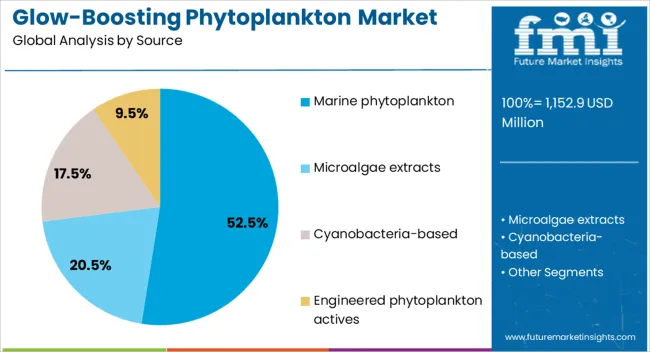
Marine phytoplankton is projected to account for 52.5% of the Glow-Boosting Phytoplankton market in 2025, establishing its position as the leading source category in the global marketplace. This dominant market share is fundamentally supported by the superior bioactivity of marine phytoplankton species, combined with advanced marine cultivation capabilities that enable sustainable production of high-quality active ingredients with proven skin-enhancing properties.
The preference for marine phytoplankton stems from its ability to provide comprehensive skin benefits through naturally occurring compounds such as omega-3 fatty acids, antioxidants, vitamins, and minerals that directly contribute to skin radiance and cellular regeneration. This source offers the highest level of biocompatibility by providing naturally concentrated nutrients that support skin barrier function, collagen synthesis, and cellular energy production, enabling formulation of products that address multiple skin concerns simultaneously.
The market leadership of marine phytoplankton is further reinforced by increasing consumer interest in ocean-derived beauty solutions and the growing availability of sustainably cultivated marine ingredients that make this technology accessible to a broader range of beauty brands. The segment benefits from partnerships between cosmetic companies and marine biotechnology firms, creating comprehensive platforms that combine sustainable cultivation practices with advanced extraction and formulation capabilities.
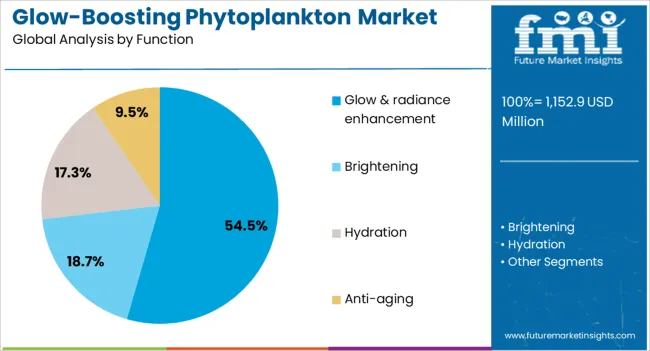
Glow & radiance enhancement applications are expected to represent 54.5% of phytoplankton-based beauty products demand in 2025, establishing their dominance in the global market landscape. This commanding market position reflects the primary consumer desire for luminous, radiant skin and the proven efficacy of phytoplankton-derived actives in delivering immediate and long-term glow-enhancing benefits.
The glow & radiance enhancement segment benefits from the sophisticated bioactive compounds naturally present in phytoplankton that can stimulate cellular energy production, enhance skin luminosity, and improve overall skin texture and appearance. Modern phytoplankton-based formulations feature concentrated combinations of marine-derived nutrients, antioxidants, and bio-stimulating compounds that are optimized for maximum radiance enhancement and skin vitality improvement.
The segment's growth is further supported by the increasing consumer focus on healthy, glowing skin as a beauty standard, rising awareness of natural radiance-boosting ingredients, and the effectiveness of phytoplankton actives in addressing dullness and uneven skin tone. Marine-derived formulations enable the creation of glow-enhancing products that provide immediate luminosity while supporting long-term skin health and radiance.
E-commerce platforms are projected to contribute 49.5% of the glow-boosting phytoplankton market in 2025, representing the preferred distribution channel for marine-derived beauty products. This distribution method aligns perfectly with the educational nature of phytoplankton-based skincare, enabling comprehensive product information sharing, ingredient transparency, and direct consumer engagement through detailed product descriptions and customer reviews.
The competitive advantage of e-commerce distribution lies in its ability to provide extensive product education through detailed ingredient listings, sustainability credentials, and usage instructions that help consumers understand the unique benefits of phytoplankton-derived actives. This channel creates direct brand-consumer relationships while enabling companies to communicate their marine biotechnology innovations and sustainability commitments effectively.
E-commerce platforms offer consumers convenience, product variety, and access to specialized marine beauty brands that may not be available through traditional retail channels. The channel supports brand storytelling around marine sustainability and enables companies to build comprehensive databases of customer preferences and purchase patterns that inform product development strategies.
The market is advancing rapidly due to technological innovation in marine biotechnology and increasing consumer demand for sustainable beauty solutions. However, the market faces challenges including high cultivation costs for marine ingredients, need for specialized production infrastructure, and varying regulatory requirements for novel cosmetic ingredients across different regions. Standardization of marine biotechnology processes and sustainable sourcing practices continue to influence market development patterns.
The growing deployment of sophisticated marine cultivation systems including controlled bioreactors, photobioreactor technology, and optimized growth media is enabling more efficient production and consistent quality of phytoplankton-derived actives. These technologies provide scalable production capabilities that enhance ingredient availability and enable continuous supply chain optimization based on market demand and seasonal variations.
Modern beauty brands are incorporating comprehensive sustainability criteria, vegan formulations, and clean-label ingredients to create holistic product profiles that appeal to environmentally conscious consumers. Integration of COSMOS certification, blue biotechnology principles, and zero-waste production methods provides deeper commitment to environmental responsibility and enables predictive sustainability approaches in product development.
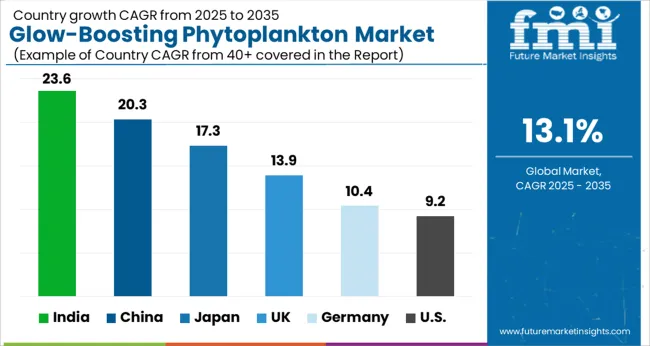
| Country | CAGR (2025 to 2035) |
|---|---|
| India | 23.6% |
| China | 20.3% |
| Japan | 17.3% |
| UK | 13.9% |
| Germany | 10.4% |
| USA | 9.2% |
The glow-boosting phytoplankton market is growing rapidly across key regions, with India leading at a 23.6% CAGR through 2035, driven by rising beauty consciousness, increasing adoption of natural skincare ingredients, and growing marine biotechnology capabilities. China follows at 20.3%, supported by strong manufacturing infrastructure and consumer acceptance of innovative beauty technologies.
Japan grows at 17.3%, emphasizing marine biotechnology innovation and premium natural beauty demand. The UK records 13.9% growth with focus on sustainable beauty trends. Germany shows 10.4% growth driven by quality and environmental responsibility preferences. The USA demonstrates steady 9.2% growth with mature market adoption and established natural beauty channels.
Revenue from glow-boosting phytoplankton products in India is projected to exhibit the highest growth rate with a CAGR of 23.6% through 2035, driven by rapid adoption of natural beauty solutions, increasing disposable income among urban consumers, and growing awareness of marine-derived skincare benefits. The country's expanding natural beauty market, combined with traditional Ayurvedic principles that align with marine ingredient concepts, creates an ideal environment for phytoplankton-based beauty solutions. Major international and domestic beauty brands are establishing comprehensive natural product portfolios and local cultivation capabilities to serve the growing demand for sustainable skincare products.
Revenue from glow-boosting phytoplankton products in China is expanding at a CAGR of 20.3%, supported by advanced manufacturing infrastructure, strong consumer adoption of innovative beauty ingredients, and significant investment in marine biotechnology research and development. The country's sophisticated production ecosystem and integration of biotechnology across various consumer sectors create a favorable environment for phytoplankton-based beauty solutions. Major technology companies and beauty manufacturers are developing comprehensive marine biotechnology platforms that combine advanced cultivation systems with efficient extraction and formulation capabilities.
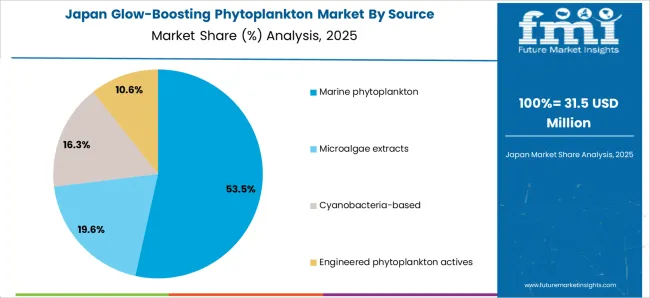
Revenue from glow-boosting phytoplankton products in Japan is growing at a CAGR of 17.3%, driven by the country's leadership in marine biotechnology innovation, sophisticated consumer preferences for natural ingredients, and strong emphasis on skincare efficacy and sustainability. Japanese consumers demonstrate high acceptance of marine-derived beauty solutions and willingness to invest in premium natural products with proven benefits. The market benefits from advanced research capabilities, established biotechnology industry infrastructure, and consumer culture that values precision and innovation in skincare formulations.
Demand for glow-boosting phytoplankton products in the UK is projected to grow at a CAGR of 13.9%, supported by strong consumer interest in sustainable beauty solutions, established natural skincare market, and growing adoption of marine-derived beauty platforms. British consumers demonstrate high willingness to invest in environmentally responsible skincare products that promise superior results through sustainable marine ingredients. The market is characterized by focus on sustainability credentials, transparency in ingredient sourcing, and integration with established natural beauty retail channels.
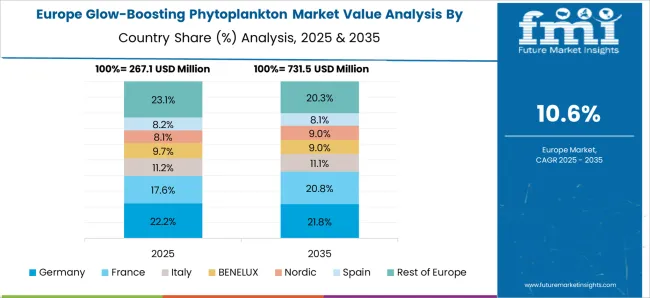
Demand for glow-boosting phytoplankton products in Germany is expanding at a CAGR of 10.4%, driven by consumer preference for scientifically-validated natural solutions, established environmental standards, and growing acceptance of marine biotechnology innovations. German consumers value sustainability, efficacy, and transparency in beauty products, creating strong demand for phytoplankton-based solutions that demonstrate clear environmental benefits and measurable skin improvement results. The market benefits from rigorous environmental standards, comprehensive regulatory framework, and consumer culture that prioritizes proven effectiveness and sustainability credentials.
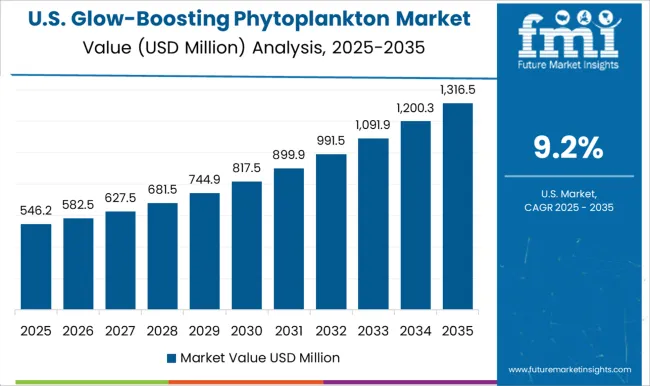
Demand for glow-boosting phytoplankton products in the USA is growing at a CAGR of 9.2%, characterized by diverse consumer segments, established natural beauty industry infrastructure, and steady adoption of marine-derived skincare solutions. The American market demonstrates strong interest in innovative natural beauty solutions while maintaining focus on accessibility, efficacy, and proven results. Market growth is supported by significant investment in marine biotechnology startups, established natural beauty distribution networks, and consumer willingness to experiment with sustainable skincare innovations.
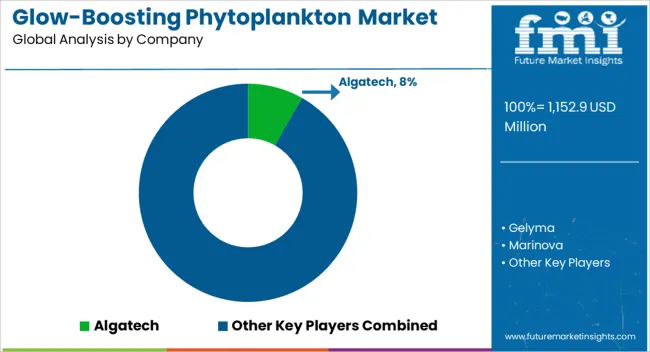
The glow-boosting phytoplankton market is characterized by competition among marine biotechnology specialists, established natural beauty companies, and ingredient innovation providers. Companies are investing in advanced cultivation technologies, comprehensive sustainability credentials, sustainable production capabilities, and direct-to-consumer platforms to deliver effective, environmentally responsible, and accessible marine-derived skincare solutions. Strategic partnerships, technological innovation, and sustainable sourcing practices are central to strengthening product portfolios and market presence.
Algatech leads the market with an 8% global value share in 2025, focusing on scientifically-backed marine biotechnology through comprehensive phytoplankton cultivation and sustainable ingredient production. Gelyma emphasizes innovative marine extraction and specialized formulation capabilities. Marinova provides comprehensive seaweed and marine ingredient solutions through established biotechnology platforms. Codif offers advanced marine biotechnology with professional-grade ingredient development.
Greentech delivers premium marine-derived actives through sustainable cultivation and innovation partnerships. Solabia focuses on comprehensive marine biotechnology platforms with established industry relationships. BASF leverages extensive chemical expertise with marine biotechnology integration. Croda provides sophisticated marine ingredient solutions through established specialty chemical capabilities. Ashland offers comprehensive formulation support with marine biotechnology enhancement. Seppic delivers advanced marine-derived actives across multiple application channels.
| Items | Values |
|---|---|
| Quantitative Units (2025) | USD 1,152.9 million |
| Source | Marine phytoplankton, Microalgae extracts, Cyanobacteria-based, Engineered phytoplankton actives |
| Function | Glow & radiance enhancement, Brightening, Hydration, Anti-aging |
| Product Type | Serums, Creams/lotions, Masks, Supplements/nutricosmetics |
| Channel | E-commerce, Natural/organic beauty stores, Pharmacies, Specialty beauty retail |
| Claim | Vegan, Clean-label, COSMOS-certified, Blue-biotech |
| Regions Covered | North America, Europe, East Asia, South Asia & Pacific, Latin America, Middle East & Africa |
| Countries Covered | United States, Canada, United Kingdom, Germany, France, China, Japan, South Korea, India, Brazil, Australia and 40+ countries |
| Key Companies Profiled | Algatech, Gelyma, Marinova, Codif, Greentech, Solabia, BASF, Croda, Ashland, and Seppic |
The global glow-boosting phytoplankton market is estimated to be valued at USD 1,152.9 million in 2025.
The market size for the glow-boosting phytoplankton market is projected to reach USD 3,948.4 million by 2035.
The glow-boosting phytoplankton market is expected to grow at a 13.1% CAGR between 2025 and 2035.
The key product types in glow-boosting phytoplankton market are marine phytoplankton, microalgae extracts, cyanobacteria-based and engineered phytoplankton actives.
In terms of function, glow & radiance enhancement segment to command 54.5% share in the glow-boosting phytoplankton market in 2025.






Full Research Suite comprises of:
Market outlook & trends analysis
Interviews & case studies
Strategic recommendations
Vendor profiles & capabilities analysis
5-year forecasts
8 regions and 60+ country-level data splits
Market segment data splits
12 months of continuous data updates
DELIVERED AS:
PDF EXCEL ONLINE

Thank you!
You will receive an email from our Business Development Manager. Please be sure to check your SPAM/JUNK folder too.
Chat With
MaRIA